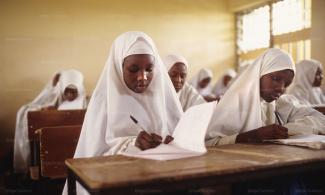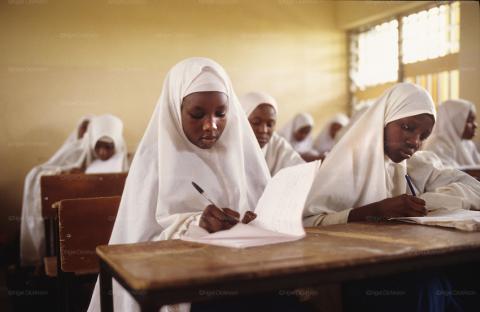
Half a dozen years on, there have been some achievements as well as snags. The school which is now under the Sokoto State Universal Basic Board (SUBEB), graduated 60 students last year, all of whom have gained admission into various boarding secondary schools across the state.

It has been six years since the Almajri Integrated Model Boarding School situated at Gagi village Sokoto South Local Government Area of Sokoto State was established with the promotion of learning of Islamic religious knowledge and western education at its core.
Commissioned on April, 10 2012 by the then President, Goodluck Ebele Jonathan, the school was the first of its kind built by the federal government to provide equal access to qualitative education for the almajiri.
With the disturbing trend of almajiris who roam the streets begging for alms, the school was targeted at creating atmosphere that is conducive for them to get the requisite education and become productive in the society.
To effectively combine traditional Islamic tutelage and conventional education, the historic school was equipped with facilities such as computer room, science laboratory, recitation hall, library, language laboratory classrooms, dormitories, clinic vocational workshop, Malam quarters and dining hall.
Half a dozen years on, there have been some achievements as well as snags. The school which is now under the Sokoto State Universal Basic Board (SUBEB), graduated 60 students last year, all of whom have gained admission into various boarding secondary schools across the state.
Mallam Abbas Shehu, excited father of Sharhabilu Abbas; one of the ex-students, said the almajiri model has changed his son from being a truant to a bright boy who has been doing well in his studies.
“The Almajiri School in Gagi is really doing very well in terms of impacting knowledge and character building in the students. The teachers are good and they ensured strict compliance with rules and regulations guiding their stay at the school,” shehu said.
The proud father added that teachers at Sultan Bello Secondary School even called his attention and notified him of the development while urging for necessary support. He said: “The other reason was having easy access to him for the support. Even when government is giving them good care, parents are also supposed to complement the gesture. We used to pay visits to assess the level of their performance and as well give them financial and other support to encourage them to study hard and Alhamdulillah the aim has been achieved.”
Another parent, Bello Dan Nana of Tsamiya Dila area Sokoto North Local Government said his 14-year-old son Kamal has achieved a lot being a student of Almajiri School.
“Before I enrolled my son, he could neither read nor write and had almost caused us problems due to his bad behaviors. While struggling to make him an upright child, my relation Sani a former vice principal at the Almajiri School Gagi decided to enroll him and today we thank Allah the boy is doing well at Sultan Bello Secondary School Sokoto after he graduated from Almajiri School Gagi.
Visibly enchanted by his child’s performance he said: “While at Almajiri School, Kamal had recited 20 Hizb of the Qu’ran and used to take fifth or sixth position in his class. Kamal who graduated in 2017 is now going to JSS2 at Sultan Bello Secondary School Sokoto and his teachers testify to his hard work and obedience.’
“I once took him to Islamiyyah after he graduated from Almajiri School to complete his recitation of the holy Quran the teacher at the school assured me that Kamal can complete the whole Qu’ran in a short time as he acquires sound foundation from the school he previously attended.”
The Almajiri integrated school Gagi which started with 50 pupils, currently has 260 pupils drawn from locals in the state, the principal, Hussani Abdullahi Muhtassibi said, adding that the school has 30 teaching staff in addition to seven Islamic studies tutors in charge of traditional Islamic education, Tsangaya system.
Daily Trust on Sunday gathered that SUBEB provides for the students with uniform, sandals, reading and writing materials as well as transport money back to their respective areas during vacation. Being a boarding school, the institution operates feeding system with three square meals offered to pupils every day.
The school is said to have won prizes during many of the LGEA Islamic quiz competitions to the great surprise of many. For instance it won jerseys and boots from the second position it recorded at a football tournaments organized by Sokoto South LGEA.
On the downside, findings revealed that some of the furniture at the school are now in deplorable state. While some chairs had suffered damage, all the beds at the dormitory completely lack mattresses. Yet during the commissioning of the project mattresses were said to have been provided for the students.
There are also allegations that some new students do run away from the school, which underscored the need for the school fence to be bounded with barb wire. Also seen as minus point was the issue that many of the pioneer staff of the school were noted to have left for more lucrative offers.
The teachers complain that they do not enjoy any form of allowance and that they are on the same salary grade as those in the regular public school across the state; hence there are calls for special package for teachers under the integration system.
Responding to these issues the principal said: “In the course of investigation, we discovered that senior student’s attitudes toward the junior ones make them to hate the environment and subsequently run away back home. We called the perfects to order and restored normalcy in the school and since then we don’t record any issue of a student running away from school.”
He, however, confirmed that there were no more mattresses as those provided had been completely destroyed by students who bed wet. He said he had officially written to SUBEB about the chairs and mattresses.
“Today, there is increase in the number of staff from 5 to 30; the water reservoir is adequately covered with a zinc and general sanitation improved. I have also extended the pipeborne water from the reservoir direct to the kitchen for staff to get water with ease. For broken down chairs and destroyed mattresses, I have officially written to SUBEB about them and waiting for response”, the principal said.
On healthcare, he said the school has a clinic operated by a doctor from neighbouring Gagi community who is being assisted by two nurses. Regarding emergency cases, the principal assured that he lives within the school compound and always respond to distress calls from sick pupils in good time.
“There is adequate electricity and water courtesy of the bore-hole and a standby generator plant which receives gasoline supply regularly from the contractor charged with the responsibility of providing the substance. The generator serves two purposes of providing electricity and pumping water from the bore-hole when there is no electricity while environmental sanitation is being given desired attention”, he said.
A Class 4 student, Umar Abubakar, from Gada Local Government area said he enjoys the school because of the knowledge and discipline he is getting. He said he likes English Hausa and Arabic language classes and wants to become a local government chairman who has concern for his people’s welfare.
Umar, who came fifth during the last examination, expressed delight for the advantage of good education.
The desk officer in charge of almajiri schools in SUBEB, Dr. Umar Mohd Boyi, said there are 17 almajiri schools across the state and that they are in three categories, including those provided and run by government. Others, he said, are owned by private indeviduals or communities but with state government support in terms of staff, structures or fund. However, he said, the one at Gagi is ‘A’ category with more facilities and is 100 percent public school.